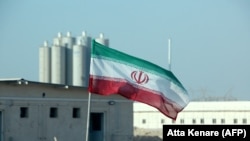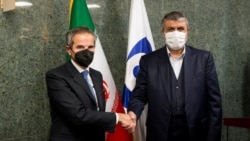On November 23, the head of the Iranian Atomic Agency (AEOI), Mohammad Eslami claimed that Iran’s nuclear activities are civilian and in full compliance with international treaties and regulations.
Eslami comments came during a joint news conference in Tehran with Rafael Grossi, the director-general of the United Nations’ International Atomic Energy Agency (IAEA), who visited Iranian capital this week seeking “common ground” with Iranian officials ahead of restarting talks on the Joint Comprehensive Plan of Action (JCPOA), commonly known as the Iran nuclear deal, in Vienna on November 29.
“The IAEA Director General has repeatedly stated that he has not seen any deviations in Iran's nuclear program,” Eslami said.
Eslami’s statement is false. IAEA Director Rafael Grossi stated following his visit to Tehran that there were issues with safeguarding Iran’s nuclear program and a deficit in monitoring capacities. Grossi told a news conference in Vienna on November 24 an agreement had not been reached with Iran on how to resolve the issues with Iran’s JCPOA compliance.
During the November 23 briefing in Tehran, Eslami blamed Iran’s “enemies” for publishing documents that raised "some questions,” which, he said, “have now been answered."
Iran accuses the IAEA of having a political agenda and has called for the “depoliticization” of the U.N. nuclear watchdog. Tehran has also criticized IAEA reports and documents on Iran’s breaches of the JCPOA.
However, Grossi said in Vienna on November 24 that the issues remain.
“Our consultations and negotiations have been inconclusive,” Grossi said. “We know what the issues are, we want to restore the monitoring capacities that we need, and we have a deficit there. We have a number of outstanding issues in the case of safeguard matters.”
The United States and European Union have pushed Iran to explain the uranium traces that the IAEA found in undisclosed locations dating back to the early 2000s. That have also demanded that Iran allow IAEA monitors to replace security cameras in Karaj, 40 kilometers (25 miles) northwest of Tehran, where a centrifuge workshop was the target of a sabotage attempt in July 2020, which Tehran blamed on Israel.
Tehran in September agreed to allow IAEA’s inspectors “to service the identified equipment and replace their storage media which will be kept under the joint IAEA and AEOI [Atomic Energy Organization of Iran] seals in the Islamic Republic of Iran.”
However, Iran did not grant the IAEA access to Karaj facility. Iran’s ambassador to the IAEA in Vienna, Kazem Gharibabadi, tweeted on September 26 that equipment in Karaj was not included in the service agreement.
Grossi said before heading to Tehran that the focus is now on continuing to monitor Iran’s nuclear facilities, but that without access to the Karaj facility, the IAEA’s monitoring and verification program is “no longer intact.”
“It hasn’t paralyzed what we are doing there, but damage that has been done, with a potential of us not being able to reconstruct the picture, the jigsaw puzzle,” Grossi told NBC News.
On November 17, the IAEA said that Iran has boosted its highly enriched uranium to 4.5 percent, surpassing the 3.67 percent cap agreed on in the nuclear deal. Tehran’s stockpile hit 113.8kg (251 pounds) earlier this month, up from 84.3kg (186 pounds) reported in September.
The agency added that Iran already has 17.7kg (39 pounds) of 60-percent enriched uranium, an increase from its previous 10kg (22 pounds).
The JCPOA was signed in 2015 between Iran and the P5+1 group - the United States, United Kingdom, France, China, Russia and Germany. Iran agreed to a long-term deal allowing U.N. inspectors to monitor its nuclear facilities and limit its activities in exchange for easing economic sanctions.
In 2018, then U.S. President Donald Trump withdrew from the nuclear deal with Iran, reinstated sanctions removed by the previous U.S. administration and imposed new restrictions, isolating the U.S. from its allies and leaving the 2015 deal in tatters.
At the time, Tehran said it would remain in the deal regardless of the U.S. actions. However, later in 2020, Tehran restricted IAEA inspections of its facilities. “Two years after Trump withdrew from the Iran nuclear deal, Tehran has cut in half the time it would need to produce enough weapons-grade fuel for a nuclear bomb,” Foreign Policy magazine reported in May 2020.
Since 2018, Iran has reportedly increased its uranium enrichment and stockpiles of nuclear fuel and developed advanced centrifuges.
U.S. President Joe Biden vowed to restore the Iran deal if Tehran agrees to abide by the provisions of the 2015 accord. However, according to NBC News, the election of hardliner Ebrahim Raisi as Iran’s president in June made the Iranian government less interested in compromising.
NBC News on November 23 cited unnamed experts as saying that Iran is now “anywhere from several weeks to two months away from having enough fissile material to build a nuclear weapon,” compared to an estimated “breakout time” of one year in 2015.
The IAEA’s Board of Governors will meet November 24-26 to discuss, among other things, the verification and monitoring of Iran’s nuclear program in light of United Nations Security Council Resolution 2231 (endorsing the JCPOA in 2015).







